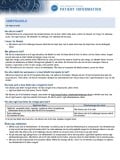Omeprazole
Sounds like 'oh-mep-ra-zole'
Key points about omeprazole
- Omeprazole is used to treat and prevent problems affecting your stomach and gut, such as indigestion, reflux and ulcers.
- It works by reducing stomach acid.
- Omeprazole belongs to a group of medicines known as proton pump inhibitors.
- It's also called Losec®.

Omeprazole reduces the amount of acid produced in your stomach. It belongs to a group of medicines known as proton pump inhibitors (PPIs).
- Omeprazole is used to treat conditions associated with high levels of stomach acid, such as indigestion, reflux and ulcers. It can prevent ulcers from forming or help the healing process where damage has already occurred.
- Omeprazole can be used to prevent ulcers caused by medicines such as non-steroidal anti-inflammatory drugs (NSAIDs). Examples of NSAIDs are diclofenac, ibuprofen, and naproxen.
- It can also be given together with certain antibiotics to get rid of Helicobacter pylori, a bacteria found in your stomach that can cause ulcers.
- For information on omeprazole in children, see omeprazole information for parents and carers.(external link)
In Aotearoa New Zealand omeprazole is available with a prescription from a prescriber for:
- capsules (10 mg, 20 mg, 40 mg)
- injection (usually used in hospital)
- a liquid suspension (2 mg in 1 mL) that your pharmacy can make for you.
Small packs of enteric-coated tablets (10 mg, 20 mg) and capsules (20 mg) are available to buy over the counter at a pharmacy. Read more about getting omeprazole without a prescription.
Omeprazole is usually available on prescription but for the short-term relief of heartburn and acid reflux, the tablets and capsules (10 mg and 20 mg) can be bought in limited quantities without a prescription from your pharmacy (over the counter or OTC).
However, don't use omeprazole without a doctor's recommendation if you:
- are under 18 years of age
- are experiencing weight loss
- have been vomiting (being sick) or have difficulty swallowing
- have symptoms of gut bleeding, eg, blood in your poo, black or dark coloured poo, vomiting blood or dark-coloured vomit
- are pregnant.
If any of these apply to you, talk to your healthcare provider.
- The dose of omeprazole will be different for different people.
- The usual starting dose of omeprazole for adults is 10 mg to 20 mg once a day.
- Depending on your response, your prescriber may increase your dose.
- Omeprazole is usually taken once a day for the relief of heartburn, acid reflux, or ulcers.
- If you’re taking omeprazole for Helicobacter pylori eradication it's likely you’ll be asked to take it twice a day.
- Always take your omeprazole exactly as your prescriber has told you. The pharmacy label on your medicine will tell you how much omeprazole to take, how often to take it and any special instructions.
- Omeprazole is available in different strengths. Ask your prescriber or pharmacist which strength you’re taking. If your medicine looks different to what you were expecting, ask your pharmacist.
- Timing: Take omeprazole at about the same time each day, preferably in the morning.
- Food: Omeprazole can be taken before or after food, although taking it before food is best.
- Take it whole: Swallow the capsule or tablet whole with a glass of water. Don’t crush or chew the capsule or tablet. The granules inside the capsules won't work properly if they are crushed or chewed.
- If you have difficulty swallowing you can:
- open the capsule and sprinkle the pellets over some fruit juice or yoghurt and swallow the granules without chewing
- dissolve the tablet in half a glass of non-fizzy water or fruit juice.
- Liquid omeprazole: Shake the bottle well and use an oral syringe or measuring spoon to carefully measure each dose.
- Missed dose: If you forget to take your omeprazole, take it as soon as you remember. If it's nearly time for your next dose, just take the next dose at the usual time. Don't take double the dose. If you're not sure what to do, ask your healthcare provider.
Here are some things to know when you're taking omeprazole. Other things may be important as well, so ask your healthcare provider what you should know about.
Avoid long-term use of omeprazole
If you’ve bought the medicine from a pharmacy or supermarket you can take it for up to 14 days. If the symptoms return or you don’t feel any better after taking omeprazole, talk to your healthcare provider to find out what’s causing your symptoms. There are usually other medicines you can try.
If you don’t need it, omeprazole shouldn't be taken long term because of the possible side effects. There may be a small increased risk of bone fractures, chest infection, gut infection and nutrient deficiencies such as low magnesium and vitamin B12.
If you’ve been prescribed omeprazole for reflux by your healthcare provider, have been taking it for longer than 4 to 8 weeks, and your symptoms seem to be well managed, talk to your healthcare provider about reviewing your medicine. They may recommend reducing your treatment. This could include:
- reducing your daily dose of omeprazole
- taking omeprazole only when you experience the symptoms of heartburn and reflux (also known as on-demand therapy)
- stopping treatment completely, as your symptoms may not return – it may be best to reduce the dose over a few weeks before stopping.
Read more about PPIs for heartburn and reflux.(external link)
Other information
- Having an endoscopy: Ask your healthcare provider if you should stop taking omeprazole a few weeks before your endoscopy. This is because omeprazole may hide some of the problems that would usually be spotted during an endoscopy.
- Other medicines: Omeprazole interacts with some medicines, herbal supplements and rongoā Māori, so check with your healthcare provider before starting omeprazole and before starting any new products.
- Pregnancy or breastfeeding: Talk to your healthcare provider if you're pregnant, planning a pregnancy or want to breastfeed.
- Liquid omeprazole: Store liquid omeprazole in the fridge. If you notice any change in the appearance of the liquid (eg, cloudiness, particles, precipitation, changes in colour to orange or black, changes in smell or taste) ask your pharmacist for advice.
Rebound acid secretion when stopping
When omeprazole is stopped, a common side effect is rebound acid secretion, where the acid secretion in your stomach increases significantly. This should return to normal within 2 weeks. Because the symptoms of rebound acid secretion are the same as for reflux (eg, indigestion, discomfort and pain in your upper stomach and chest, feeling sick and an acid taste in your mouth), it can form an ongoing loop where stopping omeprazole treatment creates the need to start it again.
Rather than restarting omeprazole, your healthcare provider may advise you to use antacids such as Acidex, Mylanta or Gaviscon. These can be effective for treating rebound acid secretion so talk to your healthcare provider if you experience it.
If you’ve been taking omeprazole long term, talk to your healthcare provider about whether they recommend you slowly reduce your dose before stopping.
Other side effects
Like all medicines omeprazole can cause side effects, although not everyone gets them. If you're concerned about any symptoms you think might be related to your medicine, talk to your healthcare provider. The following information offers some guidance but doesn't include all possible side effects.
Common side effects
Tell your healthcare provider if these side effects bother you.
- Sore stomach or feeling sick (nausea). Try taking omeprazole with or after a meal or snack.
- Feeling bloated, gas in your abdomen (tummy), farting.
- Loose stool (mild diarrhoea).
- Constipation.
Tell your healthcare provider immediately or phone Healthline free on 0800 611 116 if these occur
- Signs of low magnesium, such as muscle cramps, weakness, tiredness, feeling irritable and tingling or numbness.
- Signs of low vitamin B12 such as feeling very tired, a sore and red tongue, mouth ulcers and pins and needles.
- Skin rashes with or without a fever and joint pain.
- Signs of an inflamed bowel such as severe or ongoing diarrhoea (loose, watery, frequent poo).
Phone 111 for an ambulance or go to your nearest accident and emergency (A&E) clinic if these occur
- Signs of an allergic reaction such as itchy skin, and rash, swollen lips or tongue, problems breathing, like a tight chest or shortness of breath.
Read more about medicines and side effects and reporting a reaction you think might be a side effect.
The following links have more information on omeprazole:
Omeprazole patient information(external link) New Zealand Formulary English(external link), te reo Māori(external link)
Omeprazole consumer information(external link) TEVA, UK
Omeprazole for gastro-oesophageal reflux disease(external link) New Zealand Formulary for Children
Brochures
Omeprazole in te reo Māori(external link) My Medicines, NZ
Medicines and side effects(external link) Healthify He Puna Waiora, NZ
5 questions to ask about your medications(external link) Health Quality and Safety Commission, NZ English(external link), te reo Māori(external link)
New look omeprazole capsules(external link) Pharmac, NZ, 2025
References
- Omeprazole(external link) NZ Formulary, NZ
- Omeprazole(external link) NHS, UK
- Stopping proton pump inhibitors in older people(external link) BPAC, NZ, 2019
- Proton pump inhibitors – when is enough, enough?(external link) BPAC, NZ, 2014
- Proton pump inhibitors and the risk of acute kidney injury.(external link) BPAC, NZ, 2016
- Omeprazole for children(external link) SafeRx, NZ, 2016
-
Omeprazole: New look, same medicine(external link) Pharmac, NZ, 2025
Brochures

Omeprazole te reo Māori
NZ Formulary

Medicines and side effects
Healthify He Puna Waiora, NZ, 2024

Health Quality and Safety Commission, NZ, 2019 English, te reo Māori
Credits: Healthify editorial team. Healthify is brought to you by Health Navigator Charitable Trust.
Reviewed by: Stephanie Yee, Pharmacist, Auckland.
Last reviewed:





